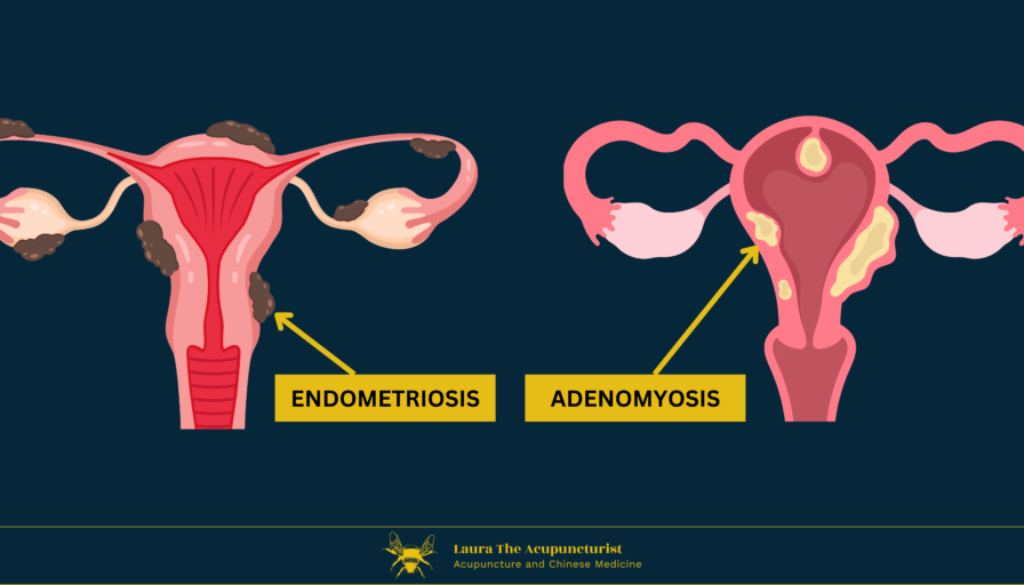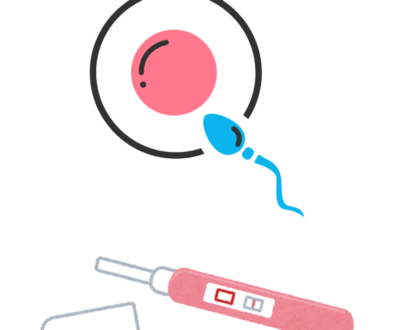Endometriosis and Adenomyosis
Endometriosis is one of the most common conditions we see in our clinic, often undiagnosed for years. If you have been struggling to conceive and are experiencing symptoms like painful periods, spotting, bowel discomfort, or unexplained infertility, it might be undiagnosed endometriosis or adenomyosis.
These conditions can be incredibly challenging, affecting both your physical health and quality of life. But with the right support, including the integration of Traditional Chinese Medicine (TCM), there are ways to help alleviate symptoms and manage these conditions more effectively.
What Are Endometriosis and Adenomyosis?
Endometriosis is characterised by tissue similar to the lining of the womb growing outside the uterus. It is commonly found on the ovaries, fallopian tubes, and pelvic lining, but can also occur elsewhere in the body. Each month, this tissue behaves just like the womb lining—it thickens, breaks down, and bleeds. Unlike the menstrual flow, however, there is no easy exit for this blood, which leads to pain, inflammation, and sometimes the formation of scar tissue.
Adenomyosis, on the other hand, occurs when similar tissue grows into the muscular wall of the uterus. It shares many symptoms with endometriosis, such as painful and heavy periods, but can also cause the uterus to become enlarged and tender.
Could You Have Endometriosis or Adenomyosis?
It’s estimated that up to 1 in 10 women may have endometriosis. The symptoms vary widely from person to person, and no two experiences are the same. Here are some common signs that may suggest you have one of these conditions:
-
Short menstrual cycles (under 26 days).
-
Spotting between periods, at ovulation, or dark brown spotting before your period starts.
-
Heavy periods with clotting.
-
Painful periods, or pain around ovulation.
-
Pain during sex or spotting afterwards.
-
Irregular bowel habits or painful bowel movements.
-
Unexplained infertility.
-
Bladder irritation.
-
IBS-type symptoms, such as bloating, constipation, or loose stools.
If you resonate with these symptoms, it’s worth discussing them with your GP or fertility specialist. Laparoscopy or MRIis often needed to confirm the diagnosis, as these are the most reliable methods.
What Causes Endometriosis?
Endometriosis is driven by oestrogen, a hormone that regulates how tissue inside the uterus grows. When oestrogen levels become too dominant, it results in increased pain and inflammation. Research suggests that this condition involves an impaired immune system, which fails to eliminate the endometrial growths, allowing them to persist and spread. It is also linked to genetic factors and imbalances in the body’s natural microbiota (the bacteria in the gut and other areas), which can lead to inflammation.
Managing Endometriosis and Adenomyosis with TCM
Western treatments often include hormonal therapy or surgery, such as hysterectomy or laparoscopy. While these approaches can help manage symptoms, they do not necessarily address the root causes of the condition. This is where Traditional Chinese Medicine (TCM), including acupuncture and herbal medicine, offers a powerful complement to conventional treatments.
How Does TCM View Endometriosis and Adenomyosis?
In TCM, endometriosis and adenomyosis are commonly associated with Liver Blood Stagnation. The Liver is an essential organ in TCM when it comes to women’s health, particularly menstrual health, as it stores and regulates blood flow.
Liver Blood Stagnation can lead to symptoms like:
-
Severe stabbing pain during periods.
-
Heavy or prolonged menstrual bleeding.
-
Painful intercourse or other physical pain, particularly in the lower abdomen.
-
Purple or dark nails and tongue, indicating poor blood flow.
TCM also identifies an element of Qi Stagnation and Dampness, which often relates to fluid retention, bloating, and inflammation—all of which are common in both endometriosis and adenomyosis.
Benefits of Acupuncture and Herbal Medicine for Endometriosis and Adenomyosis
Acupuncture is an incredibly effective tool for helping to manage the symptoms of endometriosis and adenomyosis. It works by moving both Qi and Blood, helping to relieve pain, reduce inflammation, and improve blood circulation. Acupuncture also helps regulate hormones and can significantly reduce the severity of menstrual pain.
Research, such as that found in PubMed, indicates that acupuncture is particularly helpful for women suffering from chronic pelvic pain. Patients often report less pain and improved menstrual flow after regular acupuncture sessions.
Chinese Herbal Medicine is also beneficial in addressing endometriosis. Unlike Western drugs, which may simply aim to suppress hormones or relieve pain, herbal medicine seeks to balance the underlying disharmony in the body.
In TCM, herbs are used to move stagnant blood and alleviate pain while also calming the body and reducing inflammation. A personalised prescription is key—each individual is assessed, and a unique blend of herbs is created to address their specific symptoms. Treatment plans are often developed over a 12-week period, with adjustments made as symptoms improve, and a maintenance dose may be recommended afterward.
Lifestyle Recommendations for Managing Endometriosis and Adenomyosis
While acupuncture and herbal medicine can provide relief, lifestyle modifications can also play a key role in managing these conditions:
-
Nutrition: A diet rich in antioxidants is essential to help combat inflammation. This means plenty of fresh vegetables, fruits, and healthy fats. Avoid processed foods and reduce sugar intake, which can contribute to inflammation.
-
Exercise: Gentle, regular movement like walking, yoga, or tai chi can improve blood flow and reduce stress. Avoid strenuous exercise during your period if it exacerbates pain.
-
Avoid Oestrogen Disruptors: Stay away from BPA plastics and reduce soy consumption, as these can act as hormone disruptors in the body.
-
Supplements: Consult with a nutritionist or functional medicine practitioner for supplements that may help balance your hormones. Options like vitamin D, omega-3 fatty acids, and glutathione can all support oestrogen balance and immune modulation.
-
Emotional Support: Endometriosis and adenomyosis can take a toll not just on the body but on mental well-being too. Regular practice of meditation, mindfulness, or energy-clearing exercises can help you stay grounded and calm.
Takeaway: You Are Not Alone
Endometriosis and adenomyosis can be incredibly challenging to live with, especially when trying to conceive or managing chronic pain. The good news is that there are a wide range of treatment options available to help you take control of your health. Whether you choose acupuncture, herbal medicine, or simply want to explore diet and lifestyle changes, a holistic approach is often the most effective way to manage these conditions.
If you are experiencing symptoms or have questions about managing endometriosis or adenomyosis, visit Endometriosis UK for additional resources and support. Together, we can work towards reducing your symptoms and helping you live a more comfortable, pain-free life.
Schedule an appointment with Laura The Acupuncturist.




